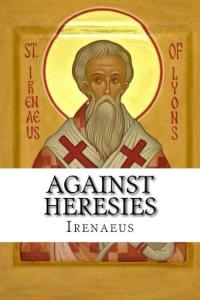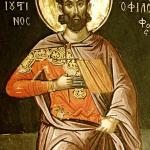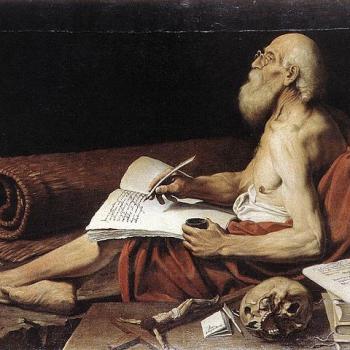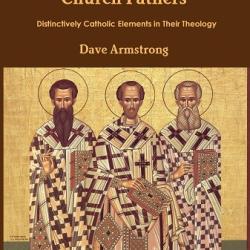“Please Hit ‘Subscribe’”! If you’ve received benefit from this or any of my 4,500+ articles, please follow this blog by signing up (email address) on the sidebar to the right, above the icon bar, “Sign Me Up!”: to receive notice when I post a new blog article. This is the equivalent of subscribing to a YouTube channel. Please also consider following me on Twitter / X and purchasing one or more of my 55 books. All of this helps me get more exposure and concretely supports my full-time apologetics work. Thanks so much and happy reading!
*****
[all citations from Against Heresies, dated from between 174 and 189, and consisting of five books. I will use Roman numerals for the book (I-V), and regular numbers for chapters and sections of chapters. I’m using the translation from the famous Schaff set of 38 volumes]
***
Grace Alone / Denial of Works-Salvation (Pelagianism)
. . . men are saved through his grace, and not on account of their own righteous actions. (I, 23, 3)
For life does not arise from us, nor from our own nature; but it is bestowed according to the grace of God. (II, 34, 3)
For as it was not possible that the man who had once for all been conquered, and who had been destroyed through disobedience, could reform himself, and obtain the prize of victory; and as it was also impossible that he could attain to salvation who had fallen under the power of sin — the Son effected both these things, being the Word of God, descending from the Father, becoming incarnate, stooping low, even to death, and consummating the arranged plan of our salvation, . . . (III, 18, 2)
. . . unless it had been God who had freely given salvation, we could never have possessed it securely. (III, 18, 7)
. . . the Lord Himself, who is Emmanuel from the Virgin, [Isaiah 7:4] is the sign of our salvation, since it was the Lord Himself who saved them, because they could not be saved by their own instrumentality; and, therefore, when Paul sets forth human infirmity, he says: For I know that there dwells in my flesh no good thing,
[Romans 7:18] showing that the good thing
of our salvation is not from us, but from God. . . . Then he introduces the Deliverer, [saying,] The grace of Jesus Christ our Lord.
And Isaiah declares this also, [when he says:] Be strengthened, you hands that hang down, and you feeble knees; be encouraged, you feeble-minded; be comforted, fear not: behold, our God has given judgment with retribution, and shall recompense: He will come Himself, and will save us.
[Isaiah 25:3] Here we see, that not by ourselves, but by the help of God, we must be saved. (III, 20, 3)
. . . men can be saved in no other way from the old wound of the serpent than by believing in Him who, in the likeness of sinful flesh, is lifted up from the earth upon the tree of martyrdom, and draws all things to Himself, [John 12:32; 3:14] and vivifies the dead. (IV, 2, 8)
. . . no one, indeed, while placed out of reach of the Lord’s benefits, has power to procure for himself the means of salvation . . . (IV, 13, 3)
. . . how can they be saved unless it was God who wrought out their salvation upon earth? Or how shall man pass into God, unless God has [first] passed into man? And how shall he (man) escape from the generation subject to death, if not by means of a new generation, given in a wonderful and unexpected manner (but as a sign of salvation) by God— [I mean] that regeneration which flows from the virgin through faith? (IV, 33, 4)
. . . through the flesh of our Lord, and through His blood, we have been saved. (V, 14, 3)
. . . man, who had been led captive in times past, was rescued from the grasp of his possessor, according to the tender mercy of God the Father, who had compassion on His own handiwork, and gave to it salvation, restoring it by means of the Word — that is, by Christ — in order that men might learn by actual proof that he receives incorruptibility not of himself, but by the free gift of God. (V, 21, 3)
Infused Justification (Including Sanctification)
. . . for this cause does the apostle, explaining himself, make it clear that the saved man is a complete man as well as a spiritual man; saying thus in the first Epistle to the Thessalonians, Now the God of peace sanctify you perfect (perfectos); and may your spirit, and soul, and body be preserved whole without complaint to the coming of the Lord Jesus Christ.
[1 Thess 5:23] . . . Those, then, are the perfect who have had the Spirit of God remaining in them, and have preserved their souls and bodies blameless, holding fast the faith of God, that is, that faith which is [directed] towards God, and maintaining righteous dealings with respect to their neighbours. (V, 6, 1)
Faith and Meritorious Good Works Organically Connected in Those Who Are Saved (Our Cooperation with God’s Grace)
He . . . may, in the exercise of His grace, confer immortality on the righteous, and holy, and those who have kept His commandments, and have persevered in His love, some from the beginning [of their Christian course], and others from [the date of] their repentance, and may surround them with everlasting glory. (I, 10, 1)
We are saved, indeed, by means of faith and love; . . . (I, 25, 5)
That, then, was called the day of retribution on which the Lord will render to every one according to his works — that is, the judgment. (II, 22, 2)
. . . if there were really no such thing as good and evil, but certain things were deemed righteous, and certain others unrighteous, in human opinion only, He never would have expressed Himself thus in His teaching: The righteous shall shine forth as the sun in the kingdom of their Father;
[Matthew 13:43] but He shall send the unrighteous, and those who do not the works of righteousness, into everlasting fire, where their worm shall not die, and the fire shall not be quenched.
[Matthew 25:41; Mark 9:44] (II, 32, 1)
As in the law, therefore, and in the Gospel [likewise], the first and greatest commandment is, to love the Lord God with the whole heart, and then there follows a commandment like to it, to love one’s neighbour as one’s self; the author of the law and the Gospel is shown to be one and the same. For the precepts of an absolutely perfect life, since they are the same in each Testament, have pointed out [to us] the same God, who certainly has promulgated particular laws adapted for each; but the more prominent and the greatest [commandments], without which salvation cannot [be attained], He has exhorted [us to observe] the same in both. (IV, 12, 3)
And that the Lord did not abrogate the natural [precepts] of the law, by which man is justified, which also those who were justified by faith, and who pleased God, did observe previous to the giving of the law, but that He extended and fulfilled them, is shown from His words. For,
He remarks, it has been said to them of old time, Do not commit adultery. But I say unto you, That every one who has looked upon a woman to lust after her, has committed adultery with her already in his heart.
[Matthew 5:27-28] And again: It has been said, You shall not kill. But I say unto you, Every one who is angry with his brother without a cause, shall be in danger of the judgment.
[Matthew 5:21-22] And, It has been said, You shall not forswear yourself. But I say unto you, Swear not at all; but let your conversation be, Yea, yea, and Nay, nay.
[Matthew 5:33, etc.] And other statements of a like nature. For all these do not contain or imply an opposition to and an overturning of the [precepts] of the past, as Marcion’s followers do strenuously maintain; but [they exhibit] a fulfilling and an extension of them, as He does Himself declare: Unless your righteousness shall exceed that of the scribes and Pharisees, you shall not enter into the kingdom of heaven.
[Matthew 5:20] For what meant the excess referred to? In the first place, [we must] believe not only in the Father, but also in His Son now revealed; for He it is who leads man into fellowship and unity with God. In the next place, [we must] not only say, but we must do; for they said, but did not. And [we must] not only abstain from evil deeds, but even from the desires after them. (IV, 13, 1)
He grants to those who follow and serve Him life and incorruption and eternal glory, bestowing benefit upon those who serve [Him], because they do serve Him, and on His followers, because they do follow Him . . . (IV, 14, 1)
. . . the Decalogue [Ten Commandments] (which, if any one does not observe, he has no salvation) . . . (IV, 15, 1)
He continues, exhorting them to what pertained to salvation: Wash you, make you clean, take away wickedness from your hearts from before my eyes: cease from your evil ways, learn to do well, seek judgment, relieve the oppressed, judge the fatherless, plead for the widow; and come, let us reason together, says the Lord.
(IV, 17, 1)
God, who stands in need of nothing, takes our good works to Himself for this purpose, that He may grant us a recompense of His own good things, as our Lord says: Come, you blessed of My Father, receive the kingdom prepared for you. For I was an hungered, and you gave Me to eat: I was thirsty, and you gave Me drink: I was a stranger, and you took Me in: naked, and you clothed Me; sick, and you visited Me; in prison, and you came to Me.
[Matthew 25:34, etc.] As, therefore, He does not stand in need of these [services], yet does desire that we should render them for our own benefit, . . . (IV, 18, 6)
He saved those that were obedient . . . who are they that have been saved and received the inheritance? Those, doubtless, who do believe God, and who have continued in His love . . . But who are they that are saved now, and receive life eternal? Is it not those who love God, and who believe His promises, and who in malice have become as little children?
[1 Corinthians 14:20] (IV, 28, 3)
. . . those who believe God and follow His word receive that salvation which flows from Him. Those, on the other hand, who depart from Him, and despise His precepts, and by their deeds bring dishonour on Him who made them, and by their opinions blaspheme Him who nourishes them, heap up against themselves most righteous judgment. (IV, 33, 15)
Still further did He also make it manifest, that we ought, after our calling, to be also adorned with works of righteousness, so that the Spirit of God may rest upon us; for this is the wedding garment, of which also the apostle speaks, Not for that we would be unclothed, but clothed upon, that mortality might be swallowed up by immortality.
[2 Corinthians 5:4] But those who have indeed been called to God’s supper, yet have not received the Holy Spirit, because of their wicked conduct shall be,
He declares, cast into outer darkness.
[Matthew 22:13] He thus clearly shows that the very same King who gathered from all quarters the faithful to the marriage of His Son, and who grants them the incorruptible banquet, [also] orders that man to be cast into outer darkness who has not on a wedding garment, that is, one who despises it. For as in the former covenant, with many of them was He not well pleased;
[1 Corinthians 10:5] so also is it the case here, that many are called, but few chosen.
[Matthew 22:14] . . . But it is one and the same God, the Father of our Lord, from whom also the prophets had their mission, who does indeed, through His infinite kindness, call the unworthy; but He examines those who are called, [to ascertain] if they have on the garment fit and proper for the marriage of His Son, because nothing unbecoming or evil pleases Him. This is in accordance with what the Lord said to the man who had been healed: Behold, you are made whole; sin no more, lest a worse thing come unto you.
[John 5:14] For he who is good, and righteous, and pure, and spotless, will endure nothing evil, nor unjust, nor detestable in His wedding chamber. (IV, 36, 6)
. . . this is plainly an indication of all heretics, and of those who do not meditate on the words of God, neither are adorned with works of righteousness; to whom also the Lord says, Why do you call Me Lord, Lord, and do not the things which I say to you?
[Luke 6:46] For men of this stamp do indeed say that they believe in the Father and the Son, but they never meditate as they should upon the things of God, neither are they adorned with works of righteousness; . . . (V, 8, 4)
. . . therefore, he who has gone forward to the better things, and has brought forth the fruit of the Spirit, is saved altogether because of the communion of the Spirit; so also he who has continued in the aforesaid works of the flesh, being truly reckoned as carnal, because he did not receive the Spirit of God, shall not have power to inherit the kingdom of heaven. . . . the things which save are the name of our Lord Jesus Christ, and the Spirit of our God. (V, 11, 1)
**
Related Reading
*
***
*
Practical Matters: Perhaps some of my 4,600+ free online articles (the most comprehensive “one-stop” Catholic apologetics site) or fifty-five books have helped you (by God’s grace) to decide to become Catholic or to return to the Church, or better understand some doctrines and why we believe them.
Or you may believe my work is worthy to support for the purpose of apologetics and evangelism in general. If so, please seriously consider a much-needed financial contribution. I’m always in need of more funds: especially monthly support. “The laborer is worthy of his wages” (1 Tim 5:18, NKJV). 1 December 2021 was my 20th anniversary as a full-time Catholic apologist, and February 2022 marked the 25th anniversary of my blog.
PayPal donations are the easiest: just send to my email address: apologistdave@gmail.com. Here’s also a second page to get to PayPal. You’ll see the term “Catholic Used Book Service”, which is my old side-business. To learn about the different methods of contributing (including Zelle), see my page: About Catholic Apologist Dave Armstrong / Donation Information. Thanks a million from the bottom of my heart!
*
***
Photo credit: image of the book cover of Against Heresies, published by Beloved publishing in 2014 [Amazon page]
Summary: St. Irenaeus denied the novel Protestant doctrine of “faith alone” or sola fide, like — scholars tell us — all of the Church fathers did. He was (surprise!) a Catholic.

















